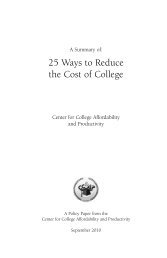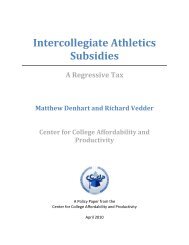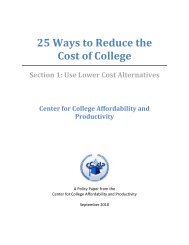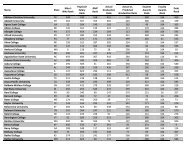Twelve Inconvenient Truths About Higher Education - The Center for ...
Twelve Inconvenient Truths About Higher Education - The Center for ...
Twelve Inconvenient Truths About Higher Education - The Center for ...
Create successful ePaper yourself
Turn your PDF publications into a flip-book with our unique Google optimized e-Paper software.
TWELVE INCONVENIENT TRUTHS ABOUT HIGHER EDUCATION<br />
or over $1,000 a student, whereas only six miles away, at the University of Michigan, the highly successful<br />
sports programs loses little money, so per student subsidies are small. Yet Michigan is largely a relatively<br />
elite school with far fewer lower income students than its more down market neighbor Eastern<br />
Michigan. In effect, not only is there an “athletics tax”, but it is often highly regressive, hurting lower<br />
income students disproportionately.<br />
What To Do?<br />
It is easier to identify problems than solutions. What do we do about all of this? <strong>The</strong>re have been lots of<br />
groups seeking re<strong>for</strong>m. I was a member of a well-publicized national commission (the Spellings Commission)<br />
a few years ago on the future of higher education that made some modest, but generally useful, suggestions<br />
<strong>for</strong> change, but relatively little was actually done. 12 When people try to even criticize operations of<br />
universities, the reaction is often ferocious. After the <strong>Center</strong> <strong>for</strong> College Accountability and Productivity issued<br />
a report that was deemed critical of faculty work practices at the University of Texas, an irate Texas alumnus<br />
made a public records requests of my activities at Ohio University, I suppose to intimidate me, and a prominent<br />
Texas politician told me that she was put under considerable pressure by University of Texas supporters<br />
not to appear on a panel with me to discuss higher education issues in Texas. It seems at times the strategy is<br />
to ostracize, intimidate and personally attack those who suggest change is needed so as to reduce criticism.<br />
I think re<strong>for</strong>m in higher education will come from a variety of pressures. First, although markets in<br />
higher education are subdued in their role in en<strong>for</strong>cing efficient behavior because of distortions from<br />
massive government subsidies and other third party payments (e.g., private philanthropy), they do have<br />
some influence, and it is growing as more of higher education is student financed. When the price of<br />
something rises, people seek substitutes, be they cheaper <strong>for</strong>ms of traditional higher education or even<br />
non-degree alternatives such as other <strong>for</strong>ms of certification of work competency. Groups such as the<br />
Khan Academy, the Saylor Foundation, open source projects at M.I.T. and other schools, and the alternative<br />
certification/ testing partnership of StraighterLine with the <strong>Education</strong>al Testing Service and the<br />
Council on Aid to <strong>Education</strong> all are doing innovative things that have considerable promise in exerting<br />
pressures to reduce or reverse the college cost explosion. <strong>The</strong> rise in costs is clearly unsustainable, and<br />
changes will be <strong>for</strong>ced on the academy.<br />
With traditional, residential-based higher education, we might see such things as an end to faculty<br />
tenure, the reduction in the administrative morass, increased intelligent use of modern technology,<br />
higher teaching loads, using facilities 12 months a year, a review of library acquisition costs and other<br />
re<strong>for</strong>ms carried out in desperation to keep costs down. Perhaps the three-year bachelor’s degree idea will<br />
gain popularity. Important pressure to make higher education more efficient is now coming from the <strong>for</strong>profit<br />
sector, whose market orientation incentivizes it to operate efficiently, and have a laser-like interest<br />
in improving the academic experience of students (or, at least, student perceptions of that experience).<br />
While the Obama Administration has shown considerable hostility towards this segment, given its high<br />
levels of efficiency and student orientation, I think it has a bright future.<br />
But remember, <strong>for</strong> many college is as much a consumption as an investment good, and many students<br />
go to college to learn—but also to have fun, make friends, and enjoy life. <strong>The</strong> “country-clubization” of<br />
higher education will continue on campuses appealing to the affluent, and an academic arms race to provide<br />
bigger and better recreational facilities and other amenities will only reverse if incomes themselves<br />
14







